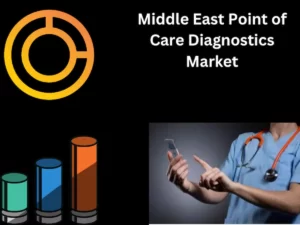© 2024 All rights reserved
Datavagyanik- Your Research Partner

Point-of-care diagnostics (POC) have become increasingly popular in the Middle East due to their ability to provide accurate and rapid diagnosis outside of traditional laboratory settings. With the rise of chronic diseases and infectious diseases in the region, there is a growing demand for POC diagnostics that can quickly and accurately identify diseases and conditions to allow for prompt treatment and management.

One major factor driving the demand for POC diagnostics in the Middle East is the increasing prevalence of diabetes in the region. According to the International Diabetes Federation, the Middle East and North Africa region have one of the highest rates of diabetes in the world. This has led to significant demand for blood glucose monitoring devices and other POC tests for the diagnosis and management of diabetes.
In addition, the COVID-19 pandemic has further increased the demand for POC diagnostics in the Middle East, particularly for infectious disease testing. POC tests for COVID-19, such as blood, nasal, and oropharyngeal swabs, have become crucial for identifying and containing the spread of the virus. This has led to a surge in demand for POC diagnostics for COVID-19 and other infectious diseases.
Another factor driving the demand for POC diagnostics in the Middle East is the region’s growing healthcare infrastructure. With increased investment in healthcare and the establishment of new medical facilities and clinics, there is a need for innovative and efficient diagnostic tools that can provide accurate and rapid results to patients. POC diagnostics offer a solution to this need by enabling clinicians to quickly and easily diagnose diseases and conditions at the point of care.
The Middle East Point of Care Diagnostics market is dominated by countries such as Saudi Arabia and United Arab Emirates (UAE). Saudi Arabia holds a major share in this region due to its large population base and high healthcare expenditure per capita.
Overall, the demand for POC diagnostics in the Middle East is driven by various factors, including the rise of chronic diseases, the COVID-19 pandemic, and the region’s growing healthcare infrastructure. As a result, the market for POC diagnostics is expected to continue to grow in the region, with an increasing number of companies investing in the development and distribution of these critical diagnostic tools.
Point-of-care diagnostics refers to medical testing that is performed at or near the point of care, such as in a doctor’s office, clinic, or patient’s bedside, rather than in a centralized laboratory. Point-of-care diagnostics can encompass a wide range of tests, including blood glucose monitoring, infectious disease testing, cardiometabolic disease testing, pregnancy and fertility testing, haematology testing, and others. These tests can be performed using various bodily fluids such as blood, nasal and oropharyngeal swabs, urine, and others, depending on the type of test being conducted.
Blood glucose monitoring is a common point-of-care diagnostic used to measure the concentration of glucose in a patient’s blood. This type of testing is used to diagnose and monitor diabetes and is often performed using a small, handheld device that provides immediate results. Infectious disease testing is also a common type of point-of-care diagnostic, used to rapidly detect the presence of infectious agents such as bacteria or viruses in bodily fluids. Cardiometabolic disease testing is used to assess a patient’s risk of developing heart disease or other metabolic conditions and may involve measuring lipid levels, inflammatory markers, or other biomarkers.
Pregnancy and fertility testing is another important application of point-of-care diagnostics, allowing for rapid and convenient testing to determine pregnancy or assess fertility status. Haematology testing may also be performed at the point of care, allowing for rapid assessment of blood cell counts and other haematological parameters. Other types of point-of-care diagnostics include tests for drug abuse, allergy testing, and various types of cancer screening. Overall, point-of-care diagnostics play an important role in improving access to healthcare and enabling rapid and effective diagnosis and treatment of a wide range of medical conditions.
Saudi Arabia’s Point of Care Diagnostics Market is also witnessing significant growth due to the rising prevalence of chronic diseases in the country. The government’s focus on improving healthcare infrastructure and increasing access to healthcare services has been a major factor driving market growth. Additionally, rising awareness about early diagnosis and treatment of diseases is also contributing to market growth. Moreover, technological advancements in point-of-care diagnostics have enabled faster diagnosis with greater accuracy which is further driving market growth in Saudi Arabia.
The UAE Point of Care Diagnostics Market is growing rapidly due to the increasing demand for rapid and accurate diagnosis of diseases. The UAE has a large population with a high prevalence of chronic diseases, such as diabetes, hypertension, and cardiovascular diseases. This has led to an increased demand for point-of-care diagnostics in the country. Additionally, the government’s focus on improving healthcare infrastructure and increasing access to healthcare services has also contributed to the growth of the market. Furthermore, the presence of major players in the region such as Roche Diagnostics, Abbott Laboratories, and Siemens Healthineers has further boosted the market growth.
The middle east Point of Care Diagnostics market has been segmented into Product and Sample.
Based on the Product, the middle east point-of-care diagnostics market is segmented into Blood Glucose Monitoring, Infectious Disease Testing, Cardiometabolic Disease Testing, Pregnancy & Fertility Testing, Hematology Testing, and Others. In 2021, blood glucose monitoring held a significant revenue share. This is mainly due to the increasing prevalence of diabetes and the need for regular monitoring of blood glucose levels to maintain optimal health. Additionally, technological advances have enabled more accurate and easier monitoring, making it more accessible and desirable for people with diabetes. As such, it is predicted that the blood glucose monitoring market will continue to grow in the coming years, as more people are diagnosed with diabetes and seek to manage the condition through regular monitoring. For instance, continuous glucose monitors (CGMs) are gaining traction due to their ability to provide real-time measurements, eliminating the need for finger prick tests.
Based on the Sample, the market is classified as Blood, Nasal and Oropharyngeal Swabs, Urine, and Others. In 2021, the blood segment was expected to dominate the market. Blood tests are used to measure levels of specific proteins, hormones, vitamins, and minerals, as well as to detect antibodies and infectious agents. By measuring these substances in the blood, doctors can accurately diagnose various diseases and conditions. This makes them an essential tool in modern healthcare and explains why their use has been growing. In addition, blood tests can also be used to monitor the progression of a disease or condition, making them an invaluable aid in managing long-term health issues. For example, blood tests can be used to monitor levels of cholesterol and glucose to assess the risk of heart disease and diabetes, respectively.
By Product
By Sample
By Region
“Every Organization is different and so are their requirements”- Datavagyanik







© 2024 All rights reserved
Datavagyanik- Your Research Partner
Add the power of Impeccable research, become a DV client